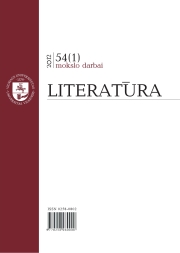TEODICĖJINIAI MOTYVAI LIETUVIŲ LITERATŪROJE: UNIVERSALUMAS IR SPECIFIKA
THEODIC MOTIFS IN LITHUANIAN LITERATURE: THE UNIVERSAL AND THE SPECIFIC
Author(s): Dalia ČiočytėSubject(s): Literary Texts
Published by: Vilniaus Universiteto Leidykla
Summary/Abstract: Theodicy is a philosophical and theological attempt to reconcile the traditional divine characteristics of omnibenevolence, omnipotence, and omniscience with the occurrence of evil and suffering in the human and natural world. The contradiction between the omnipotence of God and the evil that exists in the world is the main question of the philosophical reflection of God. The article concentrates upon the complicated term of theodicy and actualizes it in the contexts of literature. Literary theodicy is a form of existential search for God: it is literary thinking about the philosophical possibility and impossibility of God’s existence, about the paradox of God’s love and existential evil, about the justification of God in the face of innocent suffering. The works of Fyodor Dostoyevsky and Albert Camus are analyzed as the highlands of literary theodicy. In the theodic thought of Lithuanian literature, three main directions are distinguished. They are (1) interpretation of free will (Kristijonas Donelaitis, Vincas Krėvė and others), (2) linking the nation’s sufferings (occupation, exile) with the idea of spiritual growth, and (3) the reflection of the mystery of God (Šatrijos Ragana, Bernardas Brazdžionis, Antanas Škėma).
Journal: Literatūra
- Issue Year: 54/2012
- Issue No: 1
- Page Range: 173-208
- Page Count: 36
- Language: Lithuanian

